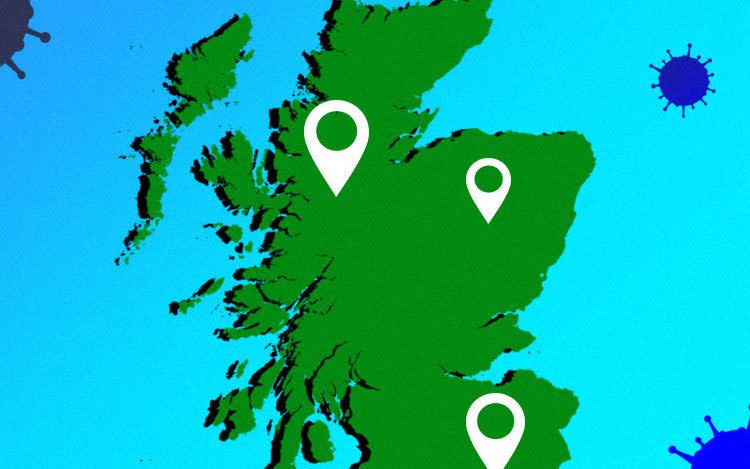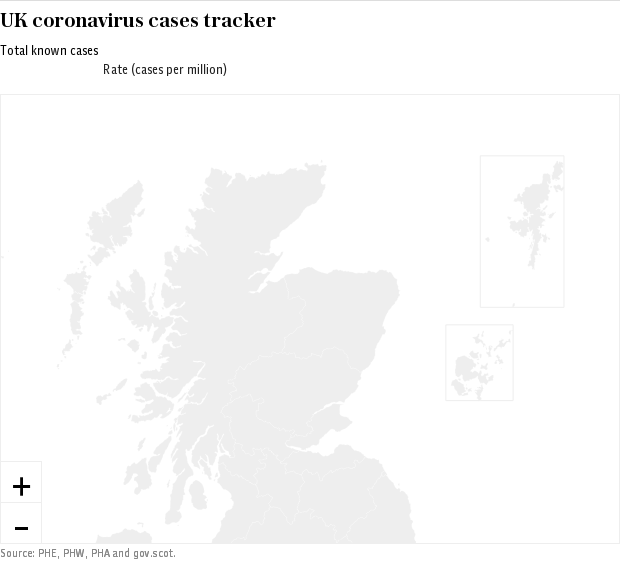Coronavirus cases in Scotland, mapped


The Covid-19 pandemic reached Scotland in early March and hundreds of cases have now been confirmed there, including Prince Charles, who remains under isolation.
Search the map below to see how many cases of coronavirus have been confirmed in Scottish local authorities

Situation in Scotland
Parts of Scotland where the coronavirus is less widespread could enjoy fewer restrictions than the rest of the country and England, the country's chief medical officer has said.
Although supporting a UK-wide approach now, Dr Catherine Calderwood said it may "not be appropriate to have all of the suppression measures in all of the country" later on.
Speaking at a press briefing alongside Nicola Sturgeon, she noted that Scotland is currently "behind" the situation in London and argued a "bespoke" response could be introduced.
Ms Sturgeon announced she has set up her own scientific advisory group to supplement the official advice given to the UK-wide Cobra meetings.
Dr Calderwood said this could be used "to apply our own Scottish data to some of these advisory measures", allowing for less stringent measures in some parts of the country.
The Prince of Wales is currently in isolation at the Birkhall estate in Aberdeenshire after testing positive for Coronavirus on Monday.
Prince Charles' wife Camilla has not contracted the virus, tests have shown.
What is a coronavirus?
Coronaviruses are a family of viruses that cause disease in animals. Seven, including the new virus, have made the jump to humans, but most just cause cold-like symptoms.
Two other coronaviruses – Middle East respiratory syndrome (Mers) and severe acute respiratory syndrome (Sars) – have killed more than 1,500 people between them since 2002.
The new virus, officially called Covid-19, is also dangerous - so far, around 20 per cent of confirmed cases have been classed as severe or critical. Around 15 to 20 per cent of hospital cases have been classed as "severe", and the current death rate varies between 0.7 per cent and 3.4 per cent depending on the location and, crucially, access to good hospital care.
This is much lower than fatality rates for Mers (30 per cent) and Sars (10 per cent), but still a significant threat.
Scientists in China believe that Covid-19 has mutated into two strains, one more aggressive than the other, which could make developing a vaccine more complicated.
Read more: how many coronavirus cases are in my area?

What are the symptoms of the new coronavirus?
According to the World Health Organization (WHO), the main symptoms of the coronavirus usually include:
A dry cough
A temperature
Tiredness
Shortness of breath (in more severe cases)
Some patients may have "aches and pains, nasal congestion, runny nose, sore throat or diarrhoea", the WHO adds. "These symptoms are usually mild and begin gradually. Some people become infected but don't develop any symptoms and don't feel unwell".
These symptoms are similar to other respiratory diseases including flu and the common cold. So if you have symptoms, consider the following:
Have you travelled to a high-risk area such as China, South Korea or Northern Italy in the last two weeks?
Have you been in close contact with someone with coronavirus?

When should I seek medical help?
People with fever, cough and difficulty breathing should seek medical attention quickly.
But you should not go out. Instead, you should call NHS 111. Also call NHS 111 if:
You think you might have coronavirus
In the last 14 days you've been to a country or area with a high risk of coronavirus
You've been in close contact with someone with coronavirus
Use this NHS advice tool to find out how to protect yourself and others.

 Yahoo News
Yahoo News 
